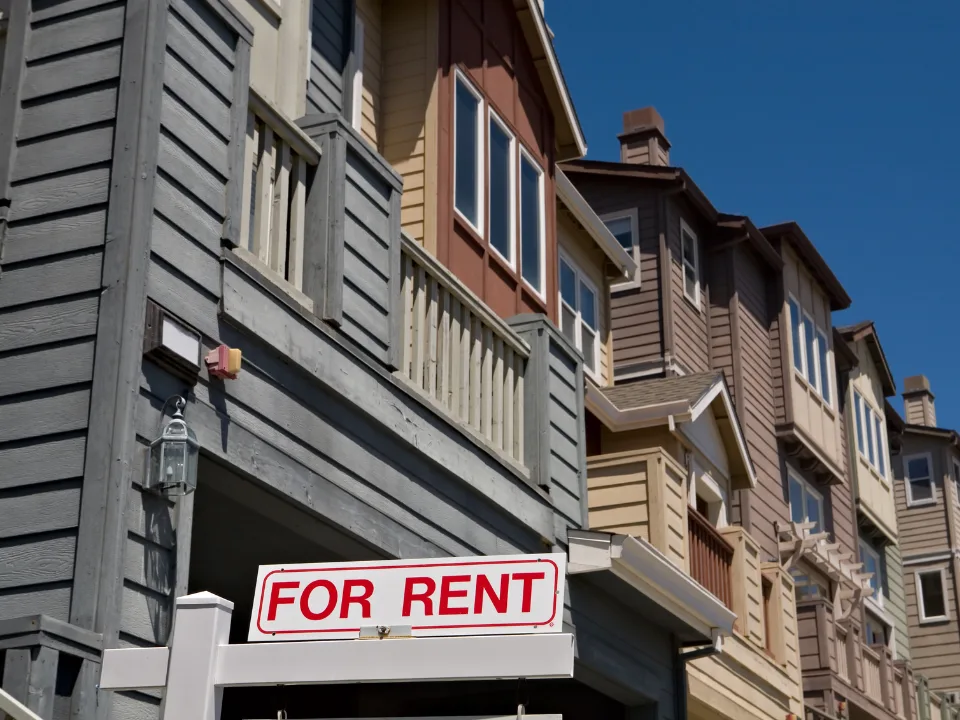NYC Rents Reach Record Highs of $5,588 in July
The NYC rental market is experiencing record-high apartment rents. Still, signs suggest that rents may be reaching a price ceiling, with declining leasing volume and an affordability threshold playing a role.
Together with
Good morning. The NYC rental market is experiencing record-high apartment rents, but the peak may be near. Minneapolis has become the first major US metro to curb inflation below the Fed’s 2% target. Meanwhile, US office loan delinquencies surged to their highest level since 2018.
👋 First time reading? Sign up here
Market Snapshot
|
|
||||
|
|
*Data as of 8/10/2023 market close.
SUMMER HIGHS
NYC Apt Rents Reach Records, But Signs Point to Potential Peak

The NYC rental market is experiencing record-high apartment rents. Still, signs suggest that rents may be reaching a price ceiling, with declining leasing volume and an affordability threshold playing a role.
Record-high rents: NYC rents have surged to their highest levels since 2008, as indicated by Miller Samuel and Douglas Elliman’s data. Manhattan’s average rent stands at $5,588, while Brooklyn and northwestern Queens see averages of $4,347 and $4,003, respectively, all setting unprecedented highs. Year-over-year, these regions experienced notable increases: Manhattan at 9%, Brooklyn at 12%, and northwestern Queens at 17%. Remarkably, for the fourth time in five months, Manhattan rent has set a new record.

Population trends: Despite Manhattan’s population drop during the pandemic, rents have risen 30% since 2019. Jonathan Miller of Miller Samuel predicts August might see record highs due to its peak rental season. This uptrend in rents contradicts analysts’ expectations. Though there’s a slight population rebound recently, numbers remain below 2019 levels.
Office market: Despite only 48% of Manhattan offices being occupied by the end of July, as per Kastle Systems, and the rise of remote work, rents in the borough keep increasing. This surge is attributed to fewer apartments available for purchase, attributed to higher interest rates, pushing potential buyers into rentals. Additionally, the post-pandemic period has seen a significant influx of younger workers to Manhattan.
Declining leasing volume: New York saw significant leasing declines: 38% in Brooklyn, 52% in Queens, and 6% in Manhattan. While Manhattan’s rental inventory rose 11% in July, new leases dropped 6%. Miller suggests this isn’t due to listing shortages, but rather renters nearing their financial limits, indicating potential affordability challenges ahead.
➥ THE TAKEAWAY
Slowly stabilizing: While hitting a price ceiling doesn’t guarantee immediate rent decreases, it suggests a transition from rapid increases to a period of rent stability, where monthly fluctuations could become more common as leasing activity slows down. Experts believe that the drop in leasing activity means rents are near short-term highs but are more likely to go down than up from here.
TOGETHER WITH VIKING CAPITAL
Diversify Your Portfolio Through Passive Real Estate Investing
At Viking Capital, we believe that multifamily investing presents a significant opportunity for investors to build sustainable wealth and achieve financial freedom through diversification.
Backed by a team of seasoned real estate experts and investment professionals, Viking Capital leaves no stone unturned in its pursuit of outperforming returns. Our investment strategy is anchored on identifying low-risk opportunities that offer significant value-add potential, enabling us to preserve our investors’ capital while maximizing their long-term growth potential.
Founded in 2015, Viking Capital investors have collectively invested over $180 million and acquired close to 5,000 units.
TWIN CITIES TRIUMPH
Minneapolis’ Affordable Housing Approach Spurs Inflation Control

A mixed-use development, with 20% of the housing reserved for lower-income renters, under construction on a 122-acre site in St. Paul, MN (Bloomberg)
Minneapolis has become the first major US metro to successfully curb inflation below the Fed’s 2% target by addressing housing affordability.
Inflation solution: Minneapolis achieved a remarkable feat by becoming the first major US metro area to successfully lower annual inflation to 1.8%, below the Fed’s 2% target, primarily attributed to its concerted effort in addressing escalating housing costs.
What once was: Well before the pandemic, the city eliminated zoning that allowed only single-family homes. And since 2018, it’s invested $320M for rental assistance and subsidies. Moody’s Analytics chief economist Mark Zandi emphasizes that expanding affordable housing is a powerful way to rein in inflation.
Construction boom: Minneapolis’s efforts to build affordable housing, including eliminating zoning restrictions and investing in rental assistance, led to a surge in apartment and condo construction, which helped curb inflation. The cost of shelter, a big factor in the CPI, and increased housing supply have helped keep prices in check.
Reining in rents: Despite initial concerns about gentrification and rising rents, these worries haven’t materialized. In fact, Minneapolis Mayor Jacob Frey noted that the opposite has occurred. Around 40% of resident income went towards housing costs in May, lower than other metros. Minneapolis stands out with rent growth of just 1% since 2017, compared to the US average of 31%.
Housing harmony: The region-wide push for affordable housing demonstrates how state and local policies can complement the Fed’s mission to manage inflation. These initiatives illustrate how regional economies to benefit when local politicians can overcome opposition to new construction, often seen in the NIMBY movement. Unlike places where housing projects faced resistance and were derailed, Minneapolis’ successful housing initiatives are the new benchmark.

➥ THE TAKEAWAY
Challenges persist: Despite success, Minneapolis grapples with inequality issues, with residents of color facing disproportionate housing cost burdens. While Minneapolis’ housing initiatives have brought stability and affordability, they have yet to eliminate all ongoing housing challenges, and stringent rent control policies have met with mixed success.
PRESSURE RISING
Office Loan Delinquencies Rise Amid Real Estate Market Pressures
Delinquencies on US office loans surged to their highest level since 2018 due to higher interest rates, inflation, and the influence of remote work on office occupancy, leasing, and valuations.

Delinquency surge: In July, over 4.95% of US office loans were delinquent by at least 30 days, a significant increase from 1.62% a year earlier and at its highest level since May 2018. Although office delinquencies are higher than the overall CMBS delinquency rate (4.41%), they remain lower than delinquencies in other property categories, such as retail (6.86%) and lodging (5.85%).
Liquidity squeeze: A “liquidity squeeze” is affecting CRE markets, with tighter credit conditions, declining asset values, and a lack of loan repayments particularly challenging for office and retail properties. A substantial portion of the $310B CMBS debt set to mature in the US by the end of 2024 originated in 2013–2014, when interest rates were lower. Tightened credit conditions have made lenders more selective in quoting and originating CRE loans.
Deleveraging in process: The collapse of regional lenders such as Silicon Valley Bank and Signature Bank this year raised concerns about CRE financing. Despite competition from CMBS and life insurance companies, banks still represented 50.6% of all outstanding CRE debt at the end of 2022. Investors are prioritizing reducing debt and safeguarding existing assets over expanding. Many lenders are also deleveraging by minimizing their CRE loan exposure.
Markets at risk: The risk ratings banks assign to office loans reveal which US office markets are susceptible to collapse. San Francisco has the highest proportion of criticized office loans, with 64.1% rated high risk in 1Q23. McKinsey predicts a 20% drop in office demand for San Francisco by 2030 due to tech downsizing, company and resident departures, and social issues. DC ranks second in risk (47.3%), followed by NY (38.8%), Baltimore (31.7%), and Phoenix (26.7%).

➥ THE TAKEAWAY
Incentivize investors: Certain cities are proactively addressing the potential shift towards higher-quality buildings by motivating investors to repurpose older office spaces. NY introduced the Manhattan Commercial Revitalization Program in May, offering tax incentives to aid investors in renovating older office buildings below 59th Street. Recognizing the need to incentivize investors, tax abatements are an effective means of encouraging capital investment.
🌐 AROUND THE WEB
📖 Read: The potential bankruptcy of WeWork (WE) will force landlords to either navigate its reorganization under Chapter 11 or contemplate Chapter 7 liquidation amid difficulties for the broader office market.
▶️ Watch: Learn how to use ChatGPT to analyze PDFs and other documents and abstract a lease in less than 30 seconds in this Massimo Minute.
🎧 Listen: In this episode of The Fort, Emily Holdman, MD of Permanent Equity, explains how she uses 30-year funds to invest in SMBs with no intention of selling.
✍️ DAILY PICKS
-
Survival of the fittest: Brokerages like CBRE, JLL, Cushman & Wakefield (CWK), and Colliers (CIGI) are expanding property management divisions to offset declining property sales.
-
Back on the market: Mall of America’s owner will not purchase a former rocket engine manufacturing site in San Fernando Valley, putting one of LA’s largest redevelopment sites back on sale.
-
Lending letdown: The US CRE market may suffer a $504B drop in mortgage originations in 2023, driven by rate volatility and increased debt costs, with multifamily expected to fall by 38%.
-
Help from HUD: HUD announced a new grant program to develop case histories of post-pandemic office-to-resi projects, offering up to $860K to enhance comprehension of financing challenges, policy reforms, and subsidies.
-
Bankruptcy blessing: Recent retail bankruptcies spark positive outcomes for shopping center REITs, like rent growth and lease signings following vacancies, despite constrained space.
-
Self-storage refi: Developer Marc Slayton secured a $28M debt package from White Oak Real Estate Capital to refi the GoodFriend Self Storage North Fork property in Long Island.
-
Office shakeup: JBG Smith, a major landlord near Amazon’s HQ2, faces a potential 1MSF of office vacancies, prompting plans to repurpose and reposition properties amid lower retention rates.
-
Expanding vision: Online eyeglasses retailer Warby Parker (WRBY) plans to expand its store count to around 900, citing the success of brick-and-mortar locations in customer acquisition and sales growth despite challenging market conditions.
-
Relocation trends: Corporate relocations surged to a 7-year high, indicating a shift in office preferences. But experts point to nuanced trends where suburban hubs, city centers, and Sun Belt states all play unique roles in an evolving corporate landscape.
-
Construction health: The Dodge Momentum Index dipped slightly in July, but the overall index remains substantially higher than a year ago, indicating continued construction health.
-
Inflation easing? The July CPI rose 3.2% annually, slightly lower than anticipated, indicating a reduction in inflation’s impact on the economy.
-
Swarming lawsuits: A series of lawsuits have been filed against CA Ventures, a Chicago-based developer, alleging that the company defaulted on $10M plus interest and fees.
-
CMBS acquisition: AG Mortgage Investment Trust, an affiliate of Angelo Gordon, has agreed to purchase mortgage specialist Western Asset Mortgage Capital for $103M, expanding its portfolio in the mortgage-backed securities and loans sector.
-
True to Texas: Despite challenges in the Texas multifamily market, Knightvest Capital’s CEO is still finding deals in the Lonestar State.
-
$500M marvel: Turnbridge Equities and Manekin, with partners PCCP LLC and Qatar Investment Authority, have started construction on Phase 1 of the 1.3MSF National Capital Business Park in DC, with 3.5M SF of Class A industrial space.
-
Markets in demand: According to RealPage, these 14 cities across the US experienced demand surpassing supply in 2Q.
-
Power surge: As scorching temperatures drive power demand to record levels, Texas power prices are set to soar over 800% on Sunday, prompting concerns about potential grid supply strains.
-
Fast food frenzy: Taco Bell (YUM) and Qdoba (APO) are embarking on major expansions, with Taco Bell aiming for 10,000 US locations while Qdoba wants to double its store count to 1,500 over the next decade.
-
Build-to-Rent: BTR developer NexMetro Communities is progressing with its new rental community projects near Dallas, including Avilla Boat Club in Fort Worth, while planning for future projects in Anna and Cleburne.
📈 CHART OF THE DAY

South Florida leads the nation in construction activity, signifying a positive trajectory for residents, as the region’s focus on building to combat unaffordability is expected to result in improved value propositions and increased urban density over the coming years.
What did you think of today’s newsletter? |




















